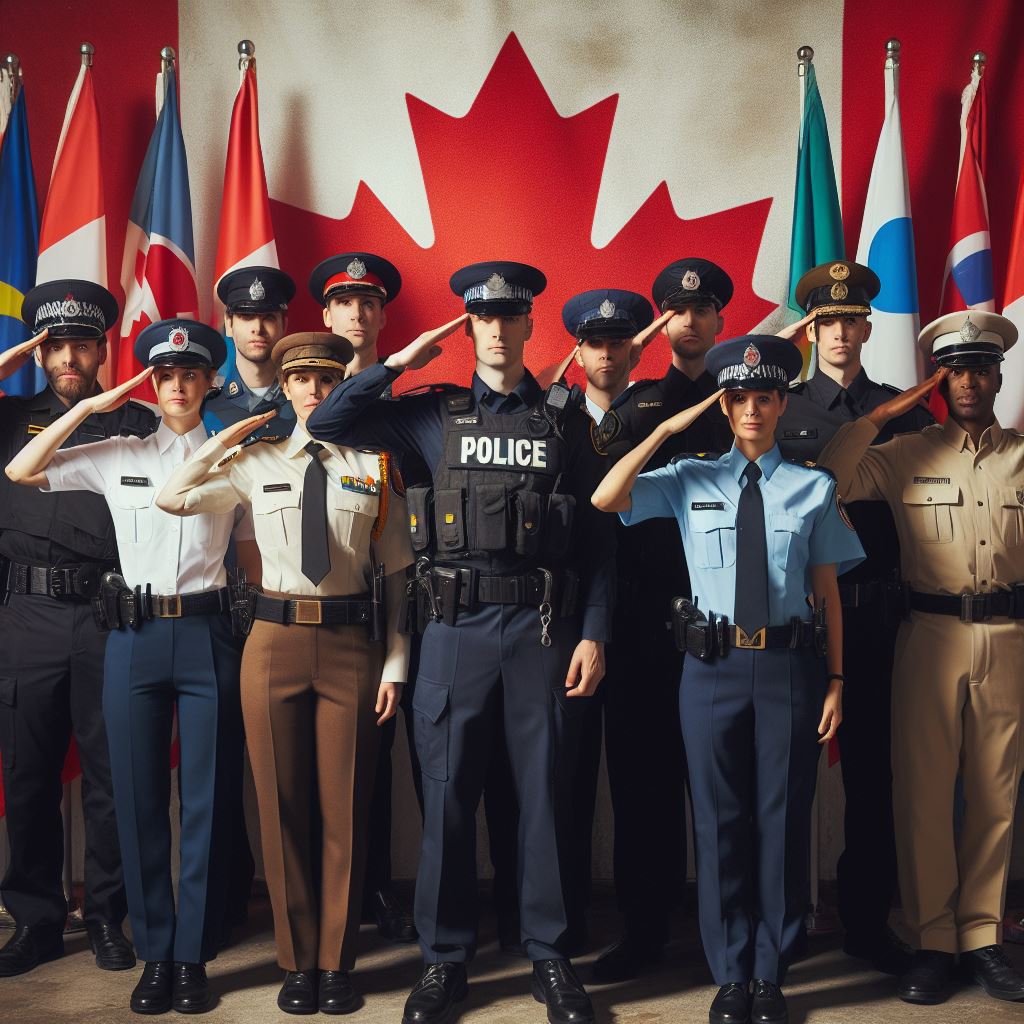Introduction
International cooperation plays a vital role in the effective functioning of Canadian police agencies.
The importance of international cooperation for Canadian police cannot be overstated.
In this blog post, we will explore the various aspects of international cooperation.
The first aspect to be discussed is the sharing of intelligence between Canadian and international law enforcement agencies.
Another crucial aspect is the collaboration in joint investigations and operations with international partners.
The significance of extradition treaties and mutual legal assistance agreements in international cooperation will also be examined.
Additionally, the role of international organizations such as Interpol and Europol in facilitating cooperation among police forces will be highlighted.
The blog post will further delve into the challenges and benefits of cross-border training programs for Canadian police.
The increasing role of technology in enhancing international cooperation and its impact on Canadian policing will be explored.
Furthermore, the importance of information and data exchange systems in promoting effective collaboration will be discussed.
Lastly, the blog post will conclude with a reflection on the future prospects and potential advancements in international cooperation for Canadian police agencies.
Basically, international cooperation is crucial for Canadian police, and this blog post will provide insights into its various aspects.
Understanding International Cooperation
International cooperation in the context of law enforcement refers to the collaboration and mutual support between police agencies from different countries.
It involves sharing intelligence, resources, and expertise to combat crime that transcends national boundaries.
Examples of why international cooperation is necessary for Canadian police
- Tackling Transnational Crime: Criminal activities, such as drug trafficking, human trafficking, and money laundering, often involve multiple countries. Cooperation with international partners is crucial to investigate and dismantle these networks.
- Cross-Border Terrorism: In an increasingly interconnected world, threats like terrorism can originate abroad and affect Canada’s security. Collaborating with global counterparts helps in intelligence gathering, tracking suspects, and preventing attacks.
- Cybercrime Prevention: Cybercriminals operate in jurisdictions beyond Canada’s reach. Close cooperation with other countries is essential to share information, track down offenders, and disrupt cybercrime networks.
- Extradition of Offenders: International cooperation is crucial for the extradition of criminals who flee to other countries. Collaboration with law enforcement agencies in these nations is necessary to ensure justice and the enforcement of Canadian court orders.
- Drug Interdiction: Illegal drug trade is a transnational problem. Working together with international partners helps Canadian police disrupt drug trafficking networks, seize contraband, and apprehend key players.
- Public Safety and Security: Cooperation with other countries allows Canadian police to access crucial information about potential threats, enabling them to take proactive measures to protect their citizens’ safety and security.
- Intelligence Sharing: Sharing intelligence with international partners helps in creating a comprehensive picture of criminal organizations’ activities. This collaboration enables early detection, prevention, and effective response to potential threats.
- Enhancing Police Training: International cooperation allows Canadian police to learn from the best practices and experiences of foreign law enforcement agencies. It helps improve their own training programs and ensures a strong, well-prepared police force.
- Interpol Membership: Canada’s membership in Interpol, the International Criminal Police Organization, facilitates international collaboration by enabling direct communication and coordination with other member countries.
- Mutual Legal Assistance: International cooperation allows Canadian police to request assistance from foreign counterparts in gathering evidence, interviewing witnesses, and executing search warrants in cross-border investigations.
Brief Summary
Essentially, international cooperation is crucial for Canadian police to effectively combat transnational crime, maintain public safety, and safeguard national security.
By collaborating with law enforcement agencies worldwide, Canadian police can confront global criminal networks, share intelligence, and enhance their capabilities in enforcing the law.
Role of Canadian Police in International Cooperation
- Canadian police agencies play a crucial role in fostering international cooperation.
- They collaborate with their counterparts from other countries to combat transnational crime.
- Canadian police agencies actively participate in various international law enforcement initiatives.
- They share intelligence, best practices, and resources with their international counterparts.
- This collaboration helps in addressing global security threats and maintaining public safety.
The role of Canadian police agencies in fostering international cooperation
- Canadian police agencies actively engage in joint investigations with international partners.
- They exchange information and coordinate efforts to combat organized crime, terrorism, and cybercrime.
- Canadian police work closely with INTERPOL, an international police organization, to share intelligence.
- They participate in global initiatives like drug enforcement, human trafficking prevention, and border security.
- By collaborating with other countries, Canadian police agencies can apprehend criminals who operate across borders.
The importance of maintaining strong relationships with international counterparts
- Maintaining strong relationships with international counterparts enhances information sharing and cooperation.
- Effective collaboration enables proactive efforts in preventing and investigating cross-border criminal activities.
- Building trust and rapport with international partners ensures smooth coordination during joint operations.
- Strong relationships facilitate the extradition process and the transfer of evidence between countries.
- By working closely with international counterparts, Canadian police agencies gain valuable expertise and global perspectives.
Therefore, the role of Canadian police in international cooperation is vital to address transnational crime effectively.
Their active engagement, information sharing, and collaboration with international counterparts contribute to global security and public safety.
Initiatives and Partnerships
The Canadian police have actively engaged in various international initiatives and partnerships, aimed at promoting collaboration and cooperation in the field of law enforcement.
These initiatives have been instrumental in addressing transnational crimes and enhancing the overall security landscape.
Specific International Initiatives and Partnerships involving Canadian Police
- INTERPOL: The Royal Canadian Mounted Police (RCMP) works closely with INTERPOL, the world’s largest international police organization, to combat global crime.
- Five Eyes Law Enforcement Group: Canada is a member of this intelligence alliance that includes the United States, the United Kingdom, Australia, and New Zealand.
- EU-Canada partnership: The Canadian police collaborate with European Union member states on various aspects of law enforcement, including information sharing and joint operations.
- International Drug Enforcement Conference: Canadian police actively participate in this conference, which brings together law enforcement agencies worldwide to discuss strategies to combat drug trafficking.
- Counter-Terrorism Initiatives: Canada participates in numerous international initiatives, such as the Global Coalition to Defeat ISIS, to prevent terrorist activities and keep communities safe.
Goals and Objectives of these Initiatives and Partnerships
The primary goals of these initiatives and partnerships are to:
- Improve information sharing and exchange intelligence to combat transnational crimes effectively.
- Strengthen cooperation among law enforcement agencies across borders to apprehend criminals and bring them to justice.
- Develop joint strategies and frameworks to tackle emerging global security challenges.
- Facilitate capacity building and training programs to enhance the skills of law enforcement personnel.
- Enhance international cooperation in investigations, particularly in areas such as terrorism and drug trafficking.
Examples of Successful Outcomes Resulting from These Collaborations
The initiatives and partnerships involving Canadian police have yielded several successful outcomes, including:
- Joint operations resulting in the dismantling of international criminal networks involved in drug trafficking, human smuggling, and cybercrime.
- Efficient sharing of intelligence leading to the timely prevention of terrorist attacks and the apprehension of suspects.
- Successful extradition of fugitives involved in serious crimes, ensuring they face justice in the appropriate jurisdictions.
- Improved coordination in combating money laundering and financial crimes, leading to the disruption of illicit networks.
- Exchange of best practices and expertise, enabling Canadian police to adopt innovative techniques and technologies in law enforcement.
Essentially, the involvement of Canadian police in international initiatives and partnerships is crucial for addressing the challenges posed by transnational crimes.
These collaborations help foster greater cooperation, strengthen security efforts, and contribute to a safer global community.
Read: Balancing Work-Life in Police Careers
Unlock Your Career Potential
Visualize a clear path to success with our tailored Career Consulting service. Personalized insights in just 1-3 days.
Get Started
Areas of International Cooperation
- Canadian police cooperate with international partners in various areas to enhance law enforcement effectiveness.
- Information sharing plays a crucial role in international cooperation among law enforcement agencies.
- Intelligence sharing is essential to combat cross-border crimes and ensure public safety globally.
- Joint investigations allow Canadian police to collaborate with international partners to solve complex criminal cases.
- Joint trainings provide an opportunity for Canadian police to exchange knowledge and expertise with their counterparts.
- Capacity building programs help improve the professionalism and skills of law enforcement agencies worldwide.
Exploring Different Areas of Cooperation
Canadian police actively engage in international cooperation to address transnational crimes such as terrorism, drug trafficking, and human smuggling.
By working closely with their international counterparts, Canadian police are better equipped to combat these global threats and safeguard their citizens.
Information Sharing
Effective information sharing is the foundation of successful international cooperation.
Canadian police exchange information with their international partners to identify and track criminal networks operating across borders.
By sharing critical intelligence, they can collectively prevent crime and apprehend offenders before they cause harm.
Intelligence Sharing
Intelligence sharing is vital in combating transnational crimes.
Canadian police collaborate with international partners by exchanging intelligence gathered through investigations and surveillance.
By pooling their resources and knowledge, they can uncover criminal activities and disrupt organized criminal networks.
Joint Investigations
Joint investigations involve Canadian police working closely with law enforcement agencies from other countries.
By pooling their expertise and resources, investigators can tackle complex criminal cases that span multiple jurisdictions.
Joint investigations promote information sharing, streamline efforts, and increase the chances of successful prosecutions.
The Significance of Joint Training and Capacity Building Programs
Joint Trainings
Joint trainings provide a platform for Canadian police to share their knowledge and best practices with international partners.
By conducting joint exercises and simulations, law enforcement agencies can enhance their operational capabilities and develop a common understanding of procedures.
These trainings also foster strong relationships and promote effective communication among participating agencies.
Capacity Building Programs
Capacity building programs aim to strengthen the capabilities of law enforcement agencies globally.
Canadian police actively participate in such programs by providing training, mentorship, and technical assistance to their international partners.
By enhancing the professionalism and skills of law enforcement agencies worldwide, capacity building programs contribute to a safer and more secure global community.
In essence, Canadian police engage in international cooperation through various areas such as information sharing, intelligence sharing, joint investigations, joint trainings, and capacity building programs.
These efforts promote collaboration, improve operational effectiveness, and help combat cross-border crimes.
By working together with their international partners, Canadian police contribute to the global law enforcement network and ensure the safety of their citizens at home and abroad.
Read: Canadian Police and International Cooperation
Challenges and Solutions
Canadian police face several challenges in their efforts towards international cooperation.
These challenges hinder effective collaboration and pose obstacles to achieving their objectives.
However, with the right strategies and solutions, these obstacles can be overcome, leading to enhanced cooperation and successful outcomes.
Identifying the challenges
- Language barriers: Communication can be a major hurdle for Canadian police when working with international counterparts.
Differences in language may lead to misunderstandings, delays, and ineffective information sharing. - Legal differences: Each country has its own legal system and frameworks, which can create complexities in coordinating investigations and sharing evidence.
Understanding and navigating these differences require significant effort and expertise. - Cultural nuances: Dealing with diverse cultures can be challenging, as it requires police officers to understand and respect cultural practices, norms, and sensitivities.
Lack of cultural awareness can impede effective collaboration and may lead to misunderstandings or misinterpretations.
Issues related to language barriers
- Miscommunications: Language barriers can result in misunderstandings, misinterpretations, and inaccurate translations, impairing effective cooperation.
- Information gaps: Inability to convey information accurately may lead to missing crucial details or failing to share significant intelligence, hampering joint efforts.
- Delayed response: Language barriers can slow down response times as officers may need to seek assistance from interpreters or translators, which can impact the timeliness of investigations and operations.
Challenges related to legal differences
- Incompatible legal systems: Different legal systems pose challenges in coordinating investigations, sharing evidence, and processing requests for legal assistance.
- Extradition complexities: Extraditing criminals across borders can be a lengthy and bureaucratic process due to varying extradition laws and procedures.
- Privacy concerns: Striking a balance between sharing necessary information and protecting privacy rights can be complex when working across jurisdictions.
Problems related to cultural nuances
- Misunderstandings: Lack of cultural awareness may lead to misunderstandings or misinterpretations of behavior, hindering effective cooperation.
- Ethical dilemmas: Ethical standards and practices may differ between countries, necessitating cross-cultural understanding and adaptability.
- Sensitivity to customs: Respecting cultural practices and sensitivities is crucial to building trust and maintaining positive relationships with international counterparts.
Potential solutions
- Language training: Providing language training to Canadian police officers can help bridge the communication gap and facilitate effective information exchange.
- Establishment of legal liaison units: Creating dedicated units to address legal differences and liaise with international counterparts can enhance coordination and streamline legal processes.
- Cultural awareness programs: Educating police officers about different cultures and promoting sensitivity can improve understanding and foster positive relationships with international partners.
In fact, despite the challenges posed by language barriers, legal differences, and cultural nuances, Canadian police can overcome these obstacles through proactive measures.
By addressing these challenges head-on and implementing effective solutions, international cooperation can be enhanced, leading to more successful joint investigations and improved security globally.
Read: Youth Outreach Programs by Canadian Police
Case Study: Successful International Cooperation Effort by Canadian Police
In this case study, we will examine a successful international cooperation effort by Canadian police.
It will discuss the specifics of the case study, including the involved countries and the achieved outcomes.
Furthermore, we will analyze the factors that contributed to the success of this particular cooperation initiative.
Case Study Specifics
Involving the Canadian police, the case study focuses on collaboration with the United States to combat cross-border drug trafficking.
The outcomes of this cooperation led to a significant decrease in drug smuggling and related criminal activities.
Furthermore, it resulted in the dismantling of multiple drug trafficking networks on both sides of the border.
This case study exemplifies the efficacy of international cooperation in the realm of law enforcement.
Factors Contributing to Success
- Information Sharing and Intelligence Collaboration: The exchange of timely and accurate information played a critical role in the success of this initiative.
- Joint Task Forces and Dedicated Resources: Jointly established task forces, equipped with necessary resources, enhanced coordination and streamlined operations.
- Responsive Legal Framework: A well-defined and adaptable legal framework helped expedite cross-border operations and facilitate information sharing.
- Effective Communication Channels: Regular and open communication channels between law enforcement agencies in both countries ensured seamless collaboration.
- Training and Capacity Building: Ongoing training programs and capacity building initiatives improved the skills and knowledge of law enforcement personnel.
- Shared Technological Infrastructure: Utilizing compatible technology platforms and databases enabled efficient sharing and analysis of information.
In general, this case study highlights the successful international cooperation effort by Canadian police in collaboration with the United States.
The case study showcases the positive outcomes achieved, including the dismantling of drug trafficking networks and the reduction of related criminal activities.
Several factors contributed to the success of this cooperation initiative, such as political will, information sharing, joint task forces, and effective communication channels.
It serves as a testament to the importance and effectiveness of international cooperation in combating transnational crime and maintaining global security.
Read: Canadian Police Forces and Diversity
You Might Also Like: Challenges Faced by Canadian Public Servants
You Might Also Like: Public Servant Pensions: What to Know
Conclusion
This blog post explored the significance of international cooperation for Canadian police.
Through various examples and insights, we highlighted how collaboration with other countries enhances law enforcement efforts.
International cooperation is crucial for Canadian police to address the increasingly transnational nature of crime.
Collaborative efforts with law enforcement agencies worldwide enhance information sharing, intelligence gathering, and the ability to combat organized crime, cyber threats, and terrorism.
Shared resources and expertise contribute to more effective crime prevention and investigation.
Collaboration fosters a unified front against global challenges, promoting the safety and security of Canadian citizens.
In an interconnected world, the exchange of best practices and joint operations strengthen Canada’s ability to adapt and respond to emerging threats, ensuring a safer environment through diplomatic partnerships and cross-border collaboration.
It is crucial for Canadian police to engage in global partnerships to combat transnational crime effectively.
These alliances not only facilitate information sharing but also promote the exchange of best practices.
To ensure the safety and security of our nation, it is essential for readers to delve deeper into this topic and support international cooperation efforts. Together, we can build a safer world.




